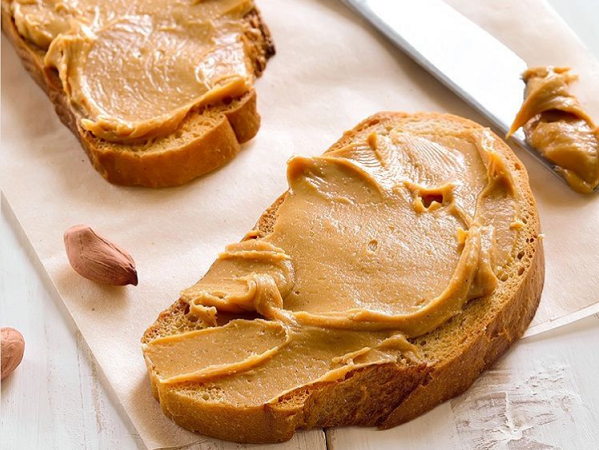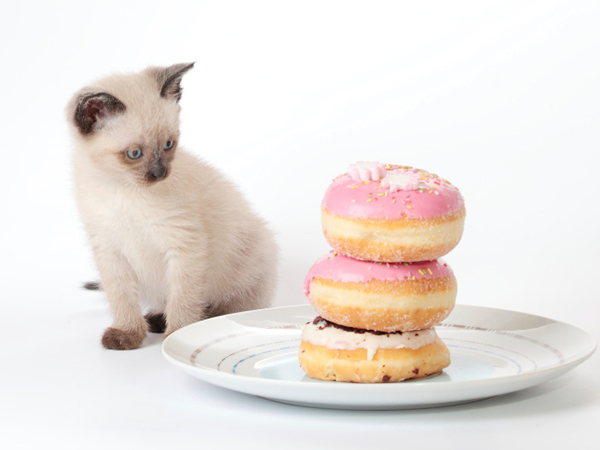News
12 food idioms and their unlikely origins
Friday, February 27th, 2015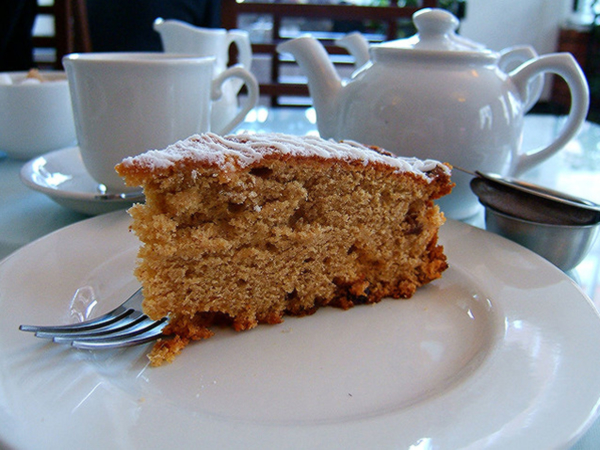
Most English language speakers pepper their speech with idioms without even thinking about it. This can result in some unfortunate mixed metaphors in restaurant reviews (“the to-die-for chocolate soufflé knocked my socks off”), but most of the time these expressions add enjoyable seasoning to our sentences. We take you through some of our favourite food idioms and their origins.
That takes the cake
In the 19th century, plantation slaves in America’s southern states would routinely gather, dressed in their finest clothes, to dance and strut to banjo music. In some instances, the best couple would win a cake. The Indiana Progress reported in January 1874: “The cake-walk, in which ten couple participated, came off on Friday night, and the judges awarded the cake, which was a very beautiful and costly one, to Mrs Sarah and John Jackson.” Baked confectionery was popular as a prize even earlier than that. As American journalist William T. Porter wrote in his 1847 novel, A Quarter Race in Kentucky: “They got up a horse and fifty dollars in money a side… each one to start and ride his own horse… the winning horse take the cakes.”
Easy as pie
The original version of this phrase was actually “easy as eating pie”, because making it is slightly more complicated. (The main challenge for us remains not eating the filling before it goes in the oven.) US magazine Sporting Life published the following baseball commentary in May 1886: “As for stealing second and third, it’s like eating pie.” In June the following year, Rhode Island newspaper The Newport Mercury ran a story that included the shortened phrase “easy as pie”.
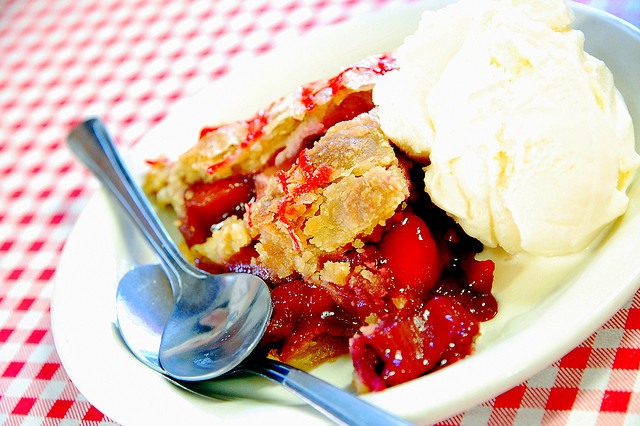
Easy as Pie. Image by Steve Snodgrass
A piece of cake
The first print evidence of this idiom, which refers to a task being particularly pleasant and easy to tackle, was in a poem called Primrose Path by American poet Ogden Nash in 1936: “Her picture’s in the papers now, and life’s a piece of cake.” We agree that a perfectly iced slice of cake can pretty much solve any problem. If you need a bit of a pick-me-up, read our list of cake recipes that will restore your faith in humankind.
Pie in the sky
Referring to a promise that never quite materialises, “pie in the sky” has a heavier history than you might guess. US immigrant labourer Joe Hill, who was a member of radical labour organisation The Industrial Workers of the World, coined the phrase in 1911. His parody song, The Preacher and the Slave, criticised the Salvation Army’s way of treating the poor:
Long-haired preachers come out every night,
Try to tell you what’s wrong and what’s right;
But when asked how ’bout something to eat
They will answer with voices so sweet:
You will eat, bye and bye,
In that glorious land above the sky;
Work and pray, live on hay,
You’ll get pie in the sky when you die.
Sell like hotcakes
This vivid idiom – we can almost feel the hotcakes’ just-baked warmth on our fingertips – originates in mid-19th century America, referring to the pancakes that swiftly sold out at church bake sales. However, Bloomberg writer Kyle Stock suggests that we need to coin a new phrase, because so many other things are selling better than hotcakes these days. (Cronuts, craft beer and Talyor Swift’s new album, for example.)
In a nutshell
For this one we turn to ancient history. Roman philosopher Pliny the Elder, credited for one of the first encyclopaedias, described Homer’s epic saga, Iliad (dated somewhere between 760-710 BC), as being written in such tiny handwriting that it could fit in a nutshell.
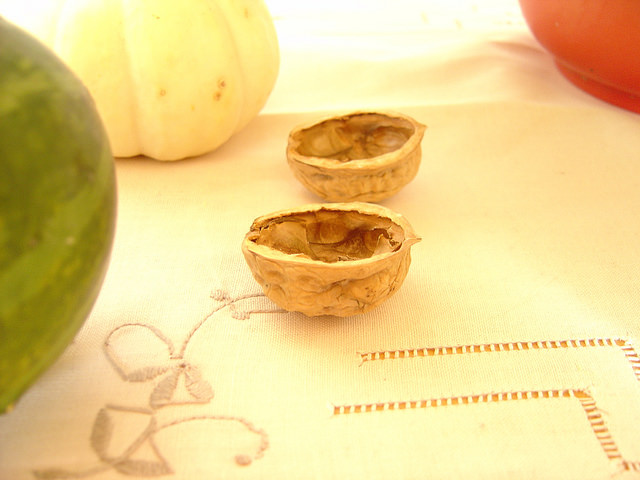
Nutshell. Image by Christoph Settgast
Red herring
Salted herrings become slightly red when smoked, as does most meat. (See the rosy ring on a well-smoked piece of brisket.) The origin of “a red herring” – a clue that’s intended to mislead someone – is quite literal. The Sportsman’s Dictionary: Or, The Gentleman’s Companion, published in London in 1686, describes “trailing or dragging of a dead cat, or fox, (and in case of necessity a red-herring) three or four miles… and then laying the dogs on the scent” as a way to test your bloodhounds. (As you do.) In the 1920s, American investment bankers started using the phrase to warn against misleading information relating to investments.
Big cheese
There is speculation that this expression refers to the 500kg cheese given to US President Thomas Jefferson in 1802. (We have follow-up questions: where can we get such a thing, and why not?) It was in vogue in the early 20th century to display a giant wheel of cheese at an event and then have it ceremonially sliced up by a VIP. (Like a red ribbon, but much more satisfying.) In 1911, The Country Gentleman newspaper reported that, “The cheese will be on exhibition at the National Dairy Show at Chicago next week. President Taft will visit the show … and after his address he will be invited to cut the big cheese, which will then be distributed in small lots to visitors.”
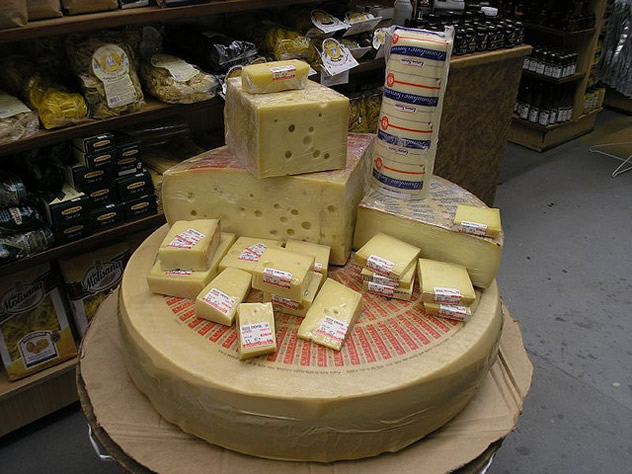
Big Cheese. Image by Charlie Brewer
Bring home the bacon
Some believe this idiom refers to the country fair challenge to catch a greased pig: if you did it, you could literally take home the bacon. In print, however, it was first used by a boxer’s mum. Joe Gans and Oliver Nelson competed for the World Lightweight Championship on 3 September 1906. New York newspaper The Post-Standard reported that before the fight Gans received a telegram from his mother: “Joe, the eyes of the world are on you. Everybody says you ought to win… You bring home the bacon.”
Not my cup of tea
The positive affirmation of something being your cup of tea first appeared in British novel Christmas Pudding in 1932. The negative usage – not my cup of tea – was first used in 1939 by British critic James Agate; then in Pulitzer-prize-winning journalist Hal Boyle’s 1944 column, Leaves From a War Correspondent’s Notebook, which described English life and manners for an American audience: “You don’t say someone gives you a pain in the neck. You just remark, ‘He’s not my cup of tea.’” As website Phrases.org.uk puts it – and as proven by our Facebook post that went viral to over 1.9 million people – “Tea remains our cup of tea.”
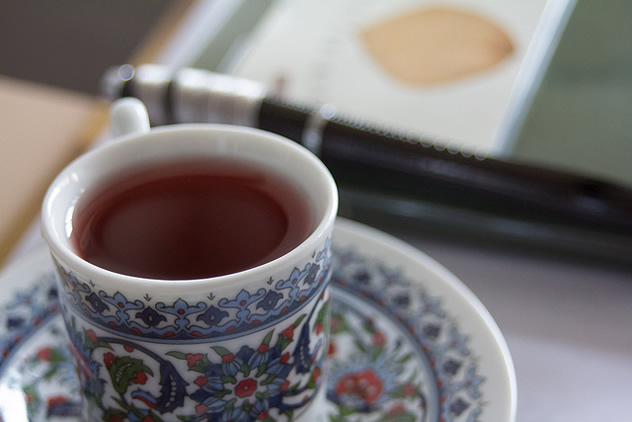
Cup of Tea. Image by Raheel Shahid
Cry over spilt milk
This must be one of the most infuriating idioms to be told. It’s my spilt milk and I’ll cry if I want to! (Especially if it was destined for hot chocolate or similar.) James Howell, a Welsh historian and writer, first recorded the phrase in 1659 as “no weeping for shed milk”, and it appeared later in a work by Irishman Jonathan Swift as “’tis a folly to cry for spilt milk”.
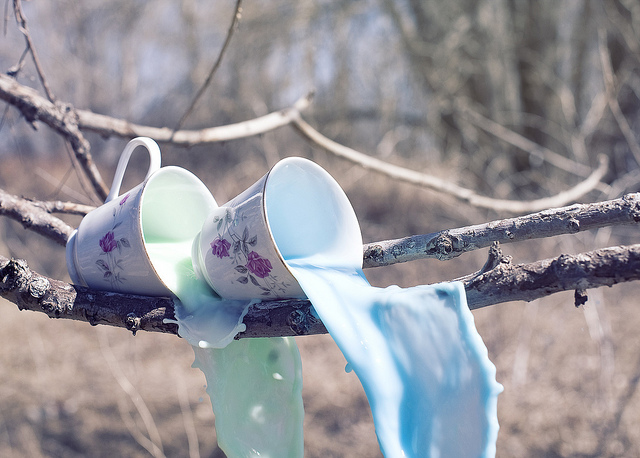
Spilt milk. Image by Esther Gibbons
Other fish to fry
In the 1700 edition of famous Spanish novel Don Quixote, the protagonist’s squire, Sancho, claims, “this is no time for me to mind niceties, and spelling of letters: I have other fish to fry.” This idiomatic phrase does not actually appear in the original Spanish; translator Peter Anthony Motteux was later criticised for taking liberties with the text. (He is also responsible for “all your eggs in one basket”.) Apparently one German dialect’s version of I’m-too-busy is something like, “I have other hedgehogs to comb”, which we would dearly like to see.





